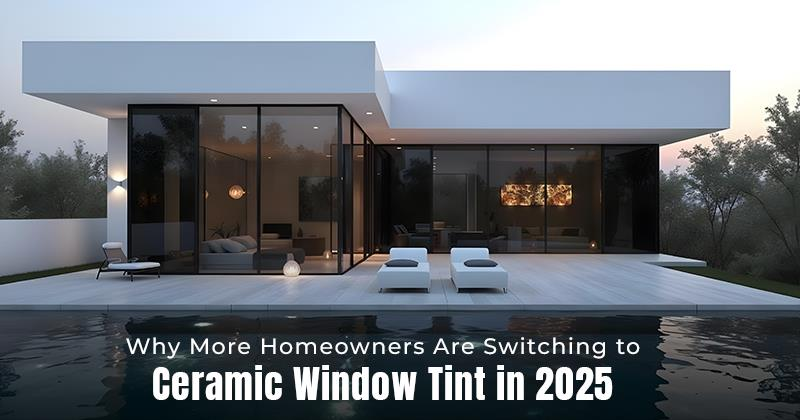Homeowners today are constantly looking for upgrades that bring comfort, savings, and style to their living spaces. In 2025, ceramic window tint is emerging as the top choice for those who want more than just a basic solution. It is not only about keeping out excess heat, but also about protecting interiors, cutting energy costs, and improving privacy.
Besides, with summers becoming hotter and energy bills steadily climbing, the switch to ceramic tint feels both practical and future-ready. More homeowners now view it as a smart, long-lasting investment for modern living.
What Is Ceramic Window Tint?
Ceramic house window tint is considered one of the most advanced options available for homeowners today. Unlike traditional dyed or metalized films, it is made with microscopic ceramic particles that are non-metallic and non-conductive. This unique technology allows the tint to block significant amounts of solar heat and up to 99% of harmful UV rays without darkening the view or creating a reflective finish.
Moreover, ceramic films are built to resist fading, bubbling, or peeling, making them far more durable than older alternatives. They maintain a clear, natural appearance while delivering powerful sun protection, improved comfort, and energy efficiency, making them a premium choice for long-term home upgrades.
Rising Concerns Driving the Shift
So, why are homeowners switching to ceramic tint now? First, energy costs are higher than ever, and people want solutions that lower monthly bills. Again, there is growing awareness of how UV rays damage skin and fade furniture. Besides, climate change has made summers longer and hotter, which increases the need for better heat control. Equally important, homeowners now care about upgrades that look good and add value.
Key Benefits of Ceramic Window Tint for Homeowners

1. Superior Heat Rejection
Ceramic window tint blocks a large portion of solar heat from entering through windows. This means rooms stay cooler without relying too heavily on air conditioning. Furthermore, reduced heat makes your home feel more comfortable throughout the day. And in the long run, you save money because your cooling system runs less often.
2. UV Protection
UV rays are not just harmful to your skin; they also cause furniture, flooring, and artwork to fade. Ceramic commercial window tint blocks up to 99 percent of these rays, offering long-term protection. Moreover, this protection helps preserve the beauty and life of your home’s interiors. And it provides peace of mind, knowing your family is safer from harmful exposure.
3. Glare Reduction
Glare from sunlight can make watching TV or working on a computer frustrating. Ceramic tint reduces glare significantly while still allowing plenty of natural light inside. What’s more, less glare means less eye strain and better visibility throughout the home. And this makes everyday tasks like reading or working much more comfortable.
4. Enhanced Privacy
Privacy is another reason many homeowners choose ceramic tint. The film allows you to enjoy natural light while keeping prying eyes out. Besides, this is useful in bedrooms, living rooms, or street-facing windows where privacy matters most. And unlike heavy curtains or blinds, ceramic tint provides privacy without making your space feel dark or closed off.
5. Durability
Ceramic window tint is built to last. It does not fade, peel, or bubble like older types of window films. Furthermore, because it contains no metals, it will not interfere with Wi-Fi, GPS, or cell signals. And with proper installation, ceramic tint offers performance that can last for many years. Lastly, most products come with warranties, giving extra assurance of quality and value.
Ceramic Tint vs. Other Films
When compared with other films, ceramic tint is clearly the better option. Dyed films are cheap, but they provide only minimal heat rejection and often fade quickly. Metalized films are stronger, but they can interfere with electronics and sometimes look too reflective. Ceramic tint, on the other hand, is non-reflective, durable, and does not block signals. Moreover, while the upfront cost may be higher, the long-term benefits make it the top choice for professional window tinting services.
Is Ceramic Window Tint Worth the Investment?
Many homeowners wonder if ceramic tint is worth the price. The answer is yes, because it offers both comfort and savings. By lowering cooling costs, it pays for itself over time. Furthermore, it protects interiors, which saves money on replacing faded furniture or flooring.
And when it comes to home value, ceramic tint adds curb appeal and market interest. Next, there is the peace of mind that comes from its durability and warranties. Lastly, whether for homes or office window tinting, ceramic window tint creates a more comfortable lifestyle, which makes it a truly worthwhile upgrade.
Final Thoughts
Ceramic tint has become the preferred choice for homeowners in 2025. And it is easy to see why. It reduces heat, blocks UV rays, minimizes glare, increases privacy, and lasts for years. Moreover, it stands out as a smart solution for families who want comfort, efficiency, and protection all in one. Finally, as energy prices continue to rise, investing in ceramic window tint is not just practical, it is essential. If you are considering an upgrade, ceramic house window tint is the step that ensures your home stays stylish, comfortable, and future-ready.
Make the smart switch to ceramic window tint in 2025. Contact All Spec Sun Control today and transform your home’s comfort and efficiency.
FAQ’s
-
How long does ceramic window tint last?
It’s very durable and can last for years without fading or peeling, often backed by a lifetime warranty.
-
Will it make my home too dark?
No, ceramic tint blocks heat and UV rays while keeping natural light and clear views.
-
Does it help reduce energy bills?
Yes, it lowers cooling costs by keeping your home cooler and more efficient.
-
Can it be installed on any window?
In most cases, yes. A professional can recommend the best film for your glass type.

